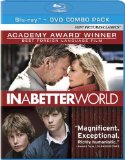| Reviews & Columns |
|
Reviews DVD TV on DVD Blu-ray 4K UHD International DVDs In Theaters Reviews by Studio Video Games Features Collector Series DVDs Easter Egg Database Interviews DVD Talk Radio Feature Articles Columns Anime Talk DVD Savant Horror DVDs The M.O.D. Squad Art House HD Talk Silent DVD
|
DVD Talk Forum |
|
|
| Resources |
|
DVD Price Search Customer Service #'s RCE Info Links |
|
Columns
|
|
|
In a Better World
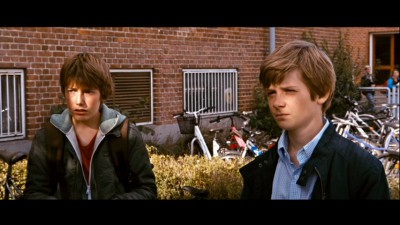
Please Note: The screen captures used here are from the DVD edition, not from the Blu-ray disc under review.
Susanne Bier's In A Better World is a film with such evident good intentions and so many worthwhile (if severely underdeveloped) thoughts in its head, I feel sort of bad for finding it rather mediocre. Bier takes on some thematic concerns that are very relevant and have some real possibilities for depth and bite: vengeance, our perhaps innate desire for it, and its potential to deform even the most steadfastly peaceable souls. But the film stumbles irretrievably in its attempt to be a challenging fable about the fragility of civilized, pacific ideals confronted with the realities of remorseless aggression and cruelty. Instead, it becomes another kind of object lesson entirely--an example of what happens when an ambitious, bright-enough filmmaker neglects to narrow down their ideas, gets bogged down in predigested sentimentality, and bites off more than they can chew.
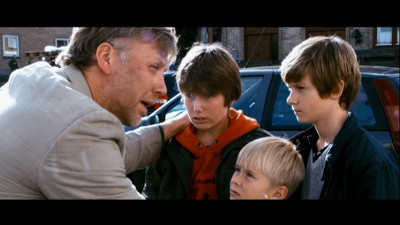
As the film opens, 13-year-old Christian (William Jøhnk Nielsen) is returning from London to Denmark with his father, Claus (Ulrich Thomsen), after losing his mother to cancer. At school, he meets and befriends Elias (Markus Rygaard), who is somewhere near the bottom of his classmates' social pecking order. When Christian tries to defend Elias from bullies, they retaliate violently, setting off an unexpectedly bitter vengefulness in the troubled Christian, whose world already feels out of control as he grapples with his mother's death and his strained relationship with his also-bereft father. Meanwhile, Elias's parents' marriage is coming apart because his father, Anton (Mikael Persbrandt), is spending too much of his time and energy away from his family on a Doctors Without Borders-like mission to Africa. The refugee camp where he volunteers faces a much higher-level bullying problem than Elias's in the form of "Big Man" (Odiege Matthew), who keeps the poor locals intimidated with his ghastly, murderous tactics.
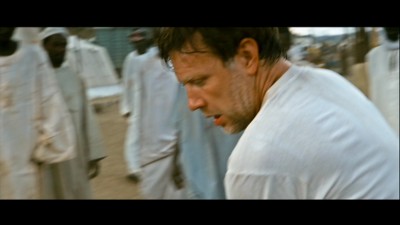
When Anton returns home, reality infringes upon his committed pacifism when a chance encounter on a playground pits him against the belligerent, thuggish father of an unruly child; later, with Elias and Christian as witnesses, he attempts (ineffectively, from their perspective) to demonstrate that talking it out with his playground nemesis, even as the man verbally abuses and slaps him, is preferable to ever condoning violence, retributive or otherwise. The two boys, already too familiar with bullies, are upset, and their sense of justice offended, by seeing Anton get pushed around while refusing to fight back. From Anton's point of view, his principles have survived this challenge. But the world is not through testing him yet; when he returns to Africa, he is confronted with the opportunity either to treat the injured, temporarily neutralized Big Man (thereby protecting him) or to let his medical ethics be superseded by local justice by turning him over to the terrorized people, implicitly permitting the violent capital punishment that would be sure to follow. Meanwhile, with Anton and his unsatisfactory opposition to fighting back a continent away, Christian convinces Elias that the man from the playground needs to be taught a lesson, and the two children veer ever closer to truly dangerous, reckless vigilantism.
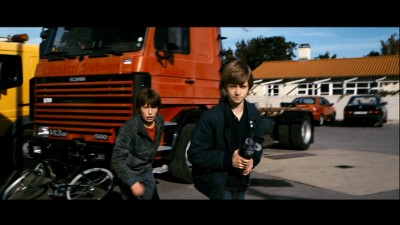
If that all sounds like something of a breathless mouthful, it unfortunately plays that way, too. By overstuffing the plot, Bier and co-screenwriter Anders Thomas Jensen have chosen breadth over depth; we get so many reiterations of the same moral dilemma, and its various presentations rely so heavily on coincidence and unusually extreme, superficially "dramatic" situations, that many of the film's events seem to have been contrived by Bier and Jensen for the purpose of hitting certain prescribed screenwriting-seminar structural beats or ratcheting up the drama, as opposed to aiding the film's self-conscious exploration of its serious themes. It is all too blunt by half, and subtlety and complexity are progressively left by the wayside. Paradoxically, all of the film's grasping for dramatic charge makes it blander and more predictable than it might have been in more relaxed, assured hands.

The style does not help matters, either. Although the cinematography (beautiful) by Morten Søborg and the editing (off-the-cuff and propulsive) by Pernille Bech Christensen are fine, they cannot overcome Bier's stubbornly middlebrow sensibility, which, like Johan Söderqvist's sub-Thomas Newman score, pervades the entire film. (Hotel Rwanda, Crash, and this are all hard evidence in the case I am always building against pseudo-"traditional" music--which always means wordless, vaguely foreign-sounding wailing set to a more or less ordinary film-score melodies and instrumentation--being used by white filmmakers to buoy scenes of darker-skinned peoples' noble suffering.) Bier is, for example, in love with that most clichéd of shots for a Western film made in Africa: the ragtag gang of anonymous African urchins racing gleefully alongside and behind the Westerners' vehicle as it rolls along (all shown from the point of view of the vehicle, of course). And, just in case we were not sure how uplifting this is supposed to be, she gives it to us again in slo-mo at the end, accompanied by Söderqvist's music as it soars to saccharine heights. This sentimental goo is, sad to say, all too indicative of In A Better World's overarching, dutifully conventional sensibility, and despite the fine performances by all the actors (Persbrandt and the children, in particular), I was as disappointed by how unmoved the film left me as I was initially optimistic about its intriguing possibilities.
THE BLU-RAY:
Leaving any content quibbles aside, the 2.35:1 anamorphic transfer of the film--AVC encoded at 1080p--is spectacular; Morten Søborg's crisp, bright color cinematography comes through with full fidelity on Blu-ray. All colors, light, and shadow distinct and clear, and there are no discernible visual flaws.
Sound:The DTS High Definition Master Audio soundtrack (in Danish, with reasonably complete and accurate English subtitles) is top of the line. The film has a sound design that, in many scenes, uses many or most of the available Dolby Digital layers to actually create a whole sonic aura, and the deluxe high-def sound lets it truly surround you in your home theater or living room in a way that well approximates the theater experience.
Extras:The extras are actually inadvertently revelatory of some of the reasons that the film does not really work. In the standard-issue, glad-handing promotional interview with Bier (complete with utterly sycophantic interviewer), she talks out of one side of her mouth about hating "message movies," and out the other about how a filmmaker must "infuse hope" into stories that may disturb people, going out of her way to dismiss the "trend" of "depressing" and "boring" European cinema along the way (could she be speaking of such important filmmakers as the Dardennes? Michael Haneke? Claire Denis?).
Bier does much the same thing in the feature-length audio commentary, dismissing "dark, stark, depressing" movies and saying in a rather Pollyannaish tone, over that faintly sick-making final slo-mo scene, that she "likes the ray of hope." She and editor Pernille Bech Christensen (her co-commentator) also discuss the screenwriting and filmmaking process in terms that suggest Bier has an Oscar-prestige-oriented diagram of The Serious Dramatic Film that she adheres to fairly religiously; if In A Better World seems rather inorganic and by-the-numbers in many spots, it could be because, as seems evident here, Bier is following an external template instead of one she has actually determined for herself to fit the needs of her particular vision (if any).
The upside of the commentary is that she and Christensen recount in a detailed way some of the logistical and mechanical dilemmas they were faced with in the process of making the film--anecdotes that make engaging stories for those of us interested in the filmmaking process and would probably be useful information for any aspiring filmmakers.
Several deleted scenes from the film are standard, expendable linking and expository material, the omission of which was probably wise, evading redundancy and lending the movie some (but not nearly enough) much-needed subtlety.
The only other extras are the film's original theatrical trailer and several others for Sony Classics releases (Incendies, Midnight in Paris, etc.). As is common practice for them at this point, Sony Pictures Classics has also generously included a DVD copy of the film in the same package.
FINAL THOUGHTS:In A Better World sees an interesting premise--even the most die-hard pacifists must have a breaking point that would lead them to violate their own civilized principles--sold out by director Susanne Bier's overly convention-bound, test-screening-bred instincts, which are actually not really instincts so much as they are conditioned reflexes (conditioned responses apparently also being just what the film assumes we will have to its overfamiliar and thus not very effective signifiers of drama, serious subject matter, and emotion). Rent It for an occasional spot of aesthetic inspiration and acting that is significantly better than the film deserves, but do not expect it to provoke too many thoughts or yield any very profound insights.
|
| Popular Reviews |
| Sponsored Links |
|
|
| Sponsored Links |
|
|
| Release List | Reviews | Shop | Newsletter | Forum | DVD Giveaways | Blu-Ray | Advertise |
|
Copyright 2024 DVDTalk.com All Rights Reserved. Legal Info, Privacy Policy, Terms of Use,
Manage Preferences,
Your Privacy Choices | |||||||









